I don’t spend a lot of time on Twitter these days but I happened to catch something last week that really spoke to me. Perhaps you’ve seen it too.
The full quoted tweet:
Shortly thereafter, I read this conversation between Merve Emre and the emerging novelist Sally Rooney in which Rooney talks about the disembodied nature of her writing process.
I don’t begrudge anyone their process. In fact, I love process. All process, any process. I find it thrilling and endlessly fascinating to see all the different ways people try to perform this task that’s been an integral part of the human experience for millennia and also an objectively weird thing to do. I am, however, thinking about whether and how all the vastly different ways writers approach the work impacts the work itself. How does a novel written amid a process described as survival training differ from one written amid the very different kind of extreme physical and mental training we call parenting? What does it mean for my writing that I’m so incredibly embodied all the time? And so many different bodies, too. The mother body and the wife body and the day job body and the squeezing in a hot yoga body and the 5 am writing body that shades into the breakfast-making and lunch-packing body.
Amanda Montei has spent a long time thinking about what it means to have a body pulled in all directions, committed to multiple projects at once, so to speak. Her book, Touched Out, and her Mad Woman Substack both wrestle with all the ways women are expected to show up in the world and at home, connecting the stories we tell and are told about our bodies in girlhood with the ones that confront us as women. A year out from publication, Amanda says she can see “the pandemic-ness” of the book, the necessity of writing about the impossible binds of motherhood from…the impossible binds of motherhood. Read on for our conversation about having babies while writing dissertations, narratives of midlife desire, and finding a new writing routine for a new phase of life.
I love interviewing people who get humanities PhDs and then go on to do unexpected things with them, and I especially like it when they have babies while trying to write their dissertations. It’s a very niche trauma!
Yes, I think it's a bumpy, rocky pipeline and not a path most would take or that I'd even necessarily recommend. I should say that before I got my PhD, I did an MFA, and so my background is very much rooted in narrative and memoir. And for whatever reason, after I finished my MFA-
You’re like, you know what’s missing here? Another, much longer degree program.
Which we could go on a tangent about what that has to do with my childhood trauma, upbringing, whatever. But I think I thought that was the way to finish the thing and to teach.
Was your PhD in creative writing?
It was in English literature but it was at a school that had a pretty established creative PhD program housed within it, the poetics program at SUNY Buffalo. And where I did my MFA was also very experimental and poetics based, and I knew a lot of people who had gone from Cal Arts to SUNY Buffalo so it felt like this kind of natural transition. But I think once I got into the PhD, I got pulled into that kind of academic writing – and also poetry, actually – and I got pretty far away from my roots in narrative and memoir. And so I think this book, in a way, was an attempt for me to figure out how to bring those two educational experiences together and those two types of writing, really. And to really think about: what does embodied theory look like?
When you spend enough time in an academic program, no matter what goals you have going into it, it’s so easy to get caught up in the goals of the program, which is really just to produce professors and academic writing, no matter how few of those jobs actually exist or whether that form of writing is a fit for the work you want to do. And spending so much time in those programs can’t help but influence the way you write and how you think about writing projects.
And I think in the program that I was in, there was a real interrogation in the culture of the lyric “I”. And I think that that caused me to be pretty self-critical about my background in memoir. And so I think I also kind of needed to get out of the program to really think about how I wanted to synthesize all of that and all of the work that I had done in literary theory and critical theory with my beliefs about memoir.
There's definitely a bias against the first person in academic writing. I mean, you can't even call it a bias. It shouldn't exist, or it should only exist in a very limited way. It was only toward the end of my time in grad school that I started to discover all these writers who were mixing criticism and the personal, and it was really revelatory to me that that was something a person could do. And of course this is something we need. I’d love to hear what you have to say about how you see personal narrative, the “I,” working in the world. What do you think it does for readers that other POVs and genres can't do?
Well, I'd say first of all that when we're talking about academic writing, there's the presumption that one is going to only use the I in this sort of objective sense. “I will argue.” I used to talk with my comp students about how it's okay to use the I to say, “I will argue blah, blah, blah,” but you don't want to bring in your personal-
But that’s it. No more first person.
Right? Exactly. And they were very confused. What do you mean? So I have to completely remove myself from this work? And so the more I taught, the more I started to say, actually, you can use your own personal experience, but it's just one form of evidence. But all of which is to say that I think within academic writing, there's a presumption that you can write objectively, which I would say is just a myth. I think that's just not true. There's no such thing as an objective neutral. We all bring our subjectivity to the work. So first of all, I think it's acknowledging that, and obviously there's a very rich tradition of blending what we're calling the personal or memoir with theory, with culture, writing within feminism, within the feminist tradition. In Touched Out, I refer to Adrienne Rich a lot. Her work is really, really influential on my own in the way in which she does sort of blend personal stories with really rich and rigorous theoretical work and cultural history and all of that. I also think that the idea of personal writing is pretty vague. There's so many genres of nonfiction today, there's so many ways to talk about that genre. So it's kind of like a can of worms, right? The dismissiveness around memoir and the essay or so-called personal writing, I think in part that's a gendered thing. This is a traditionally feminine genre, and so there's a trivialization of the genre. But I think there's also this implication that when one is writing with the I, we're doing it self-indulgently.
Men have written personal narratives but they’re categorized differently. They become war literature or-
The Things They Carried.
Right, exactly. They automatically get shifted away to a different genre, or we create another genre for them, if only on the bookstore shelves.
Right, so we could also trouble the idea that it is a feminine genre, but I think the other thing is the explosion of recent memoir by women, as well as some of the ways in which I think the genre of nonfiction is kind of starting to blend with the genre of self-help and how a lot of that work is often marketed toward women. And to me, that's sort of a different yet related genre. I think when we're talking about literary memoir and literary essay, the self is just one way into the subject. I don't think I would say it's a better way into the subject, but it is a genre, it's a mode of writing. The narrator is still a character in memoir, we're drawing on the tools of narrative. We're creating character and scene and all these things. And usually the narrator is one who's just very curious and searching and struggling. And I think that's very characteristic of the genre and something that I like because there's a sort of tentative exploratory nature. We're wandering through the subject. I'd also say that memoir, because it is about real life, is a way of expanding the archive, both in terms of historical record and preserving historical memory, but also in the way that we are allowed to talk more broadly about lived experiences. And so I think that that is potentially a kind of different power – not better, but a different power that memoir has is it's actually giving people hopefully new language to talk about their own subjectivity.
So talk to me about the seeds of this book. Was the personal your door into it?
I had always written about motherhood. My first book was with a little indie press, and that was actually the book I completed when I was in my MFA. And it was about my mother and my childhood growing up in LA.
So motherhood from the other side, as the child.
Exactly. And part of what I was trying to do formally in that book was think about the way in which our mothers stories are always disrupting our own. So it actually uses a footnote structure where she's constantly interrupting me and correcting me,
Oh, I love that.
Whether as inner critic or super ego or whatever. When I was becoming a mom, I was also finishing my PhD and working on my dissertation, which was about feminist art that looked at domestic labor and motherhood. I was like, well, obviously I'm going to write about this experience, it's the only way that I know how to make sense of the world. I wanted to write a book of essays about motherhood and I think I thought I would maybe draw on my dissertation, but I knew I didn't want to write an academic book. And in the end, this book is not my dissertation at all. I think I talk a little bit about working on the dissertation and so some of the artworks, like Mary Kelly, come up in this book, but unfortunately, I didn't get to sort of copy paste from the dissertation. I had to write a whole new book.
Very inconvenient.
But I mean, in all honesty, I think when I was writing it, I was really sort of figuring out how to synthesize those two parts of my brain, like the narrative and the theoretical, and literally how to be an embodied thinker on the page. And there's probably things I would do differently now or that would just feel a little bit more organic to me now. When I was writing this book, I would think, ‘how do I braid these two types of thinking?’ And I think for me now, they're more naturally of the same kind.
Can you say more about that?
It's just the way that I process my own personal experiences now is through the theory that I've read and through the culture that I consume. But I think when I sat down to write this book, it was like, okay, I'm going to write a little personal moment and then I'm going to kind of pivot away and look at the broader culture or whatever. So I think just in going through the process of the book, I became more aware of that tendency in my own writing to treat these as two modes. And actually when I teach, I still sometimes talk about what are the modes that you want to bring into your work? But I think for a blended work like this to be successful, that narrative character sort of has to be in all modes at once.
I felt like becoming a parent while I was in academia did weird things to me when it came to the modes. For a while I felt like the critical mode was too present when I was trying to figure out how to be a parent and at a certain point I had to just section it off to maintain my sanity and to just be a body taking care of another body without overthinking. Going to Disney World, for example, toward the end of grad school was an exercise in quieting the critical analysis in my head so I could experience my child’s un-critical joy. But I agree that I like having both of those modes on the page. That's where I want them to be together, not in my head while I'm parenting. Does theory help you while you’re parenting?
Depends what theory, right? Certainly child development theory does not help me really. In terms of parenting, it's about finding a healthy balance, but also maybe about, for me at least, finding a way to bring those modes together where they're not competing or hating on each other. I totally relate to what you're saying in terms of the sort of analysis paralysis of the world around you and just kind of wanting to be in the moment and experience.
I think I've gotten better at it as I've parented more children and for a longer period of time, or maybe I'm just too tired to overthink things.
The way I look at it with parenting is that my kids are not my theoretical project. And so it's one thing to be analyzing Disneyland and another thing to be analyzing your kid at the same time. Parenting is, I think, highly creative and theoretical because that's what we're doing is we're telling the story of the world to our kids and talking to them about gender and bodies and all these things. So I think I have to remind myself that I can present a perspective to them and that that's sort of the best that I can do. I can be the mom who's always annoyingly talking about gender and patriarchy and capitalism and inequality and things like that, but I can't control their behavior. I can’t control what they do with the stories that I tell them. And so I think as a parent, sort of learning perpetually, constantly to try not to control and to just offer is maybe how I let those theoretical ideas live in my parenting.
But this gets into something I thought about while I was reading your book. I am at times acutely aware of my position as mother, as parent. Offering something as a parent is different than anybody else doing it because I'm going to be the footnotes in their memoir one day, right? I’m that voice in their head. The stories that I tell about the world have a very different character, a different weight.
I write about that in the book, about feeling really overwhelmed by the power I had as the parent and feeling like I could say anything and I would make it true, and that it was really overwhelming. It felt like that meant that I could say the wrong thing and make it true. It meant I could say things that are damaging or become that footnote later. And of course, the culture we live in really drives that point home that, especially as the mother, everything that you do around your child has power, has really high stakes, has the potential to traumatize your child forever. I think a lot of this book was me sort of living with that, living inside of that. What do I do with that? What do I do with that power? And also, a lot of this book is about articulating ways in which I felt out of control or without autonomy or lacking power in my life, and then trying to remind myself or find a different language other than this is my child's fault, because I don't believe that at all. I don't believe that children are the reason that parenting is so hard today. Obviously, children are difficult, all humans are difficult to be in relation with, but I don't think that's really what we are talking about. When mothers online express frustration with their children, I think that oftentimes they're frustrated with domestic inequality, with partners, with lack of social supports, with a culture that is hyper focused on how moms can traumatize their kids by saying the wrong thing. So I think writing the book allowed me to articulate a lot of that and notice how that power differential shows up and, therefore, what is my responsibility here? One of the scenes that I write about in the book is seeing my daughter play mom, and noticing that she's exhausted and tired and lugging a bunch of bags around and sighing, and having that reality reflected back at me and realizing that that was not the picture that I wanted to give her. And that meant that I needed to see where in my life I did have some agency and autonomy, which gets really sticky because it's like we don't want to say that when mothers are suffering like that, they need to just make better choices. That's where consent comes in too, how complicated it is to create a life that feels like one that you've consented to when we live in a culture that really seeks to disempower women at every turn.
I interviewed Sarah Manguso a few months ago, and she feels that the problem of being a mother – more or less the challenges you were just articulating – is really the problem of being a wife. That the threat to the work, to self-expression and self-knowledge, and to autonomy and all of that stuff came from being married rather than from being a parent. I'm curious about how you see that tension, particularly a year after publication and especially in light of your recent essay about the end of your marriage and how your new emerging family arrangement, as you wrote, “contains more care and intention than is possible in marriage.”
Well, I think that I would agree with what Manguso is saying in terms of expanding the conversation that we have seen in the mainstream about what makes motherhood so hard. And again, as further turning away from the idea that children are the problem for just being children. And I think we've actually seen, not just in Manguso’s work, but in a lot of writing around the divorce books that came out in the past year, this idea that it's not actually motherhood that's the problem, it's marriage. And I think that I would just say that separating the two in our current culture and American culture is pretty challenging because our society is set up for the nuclear family. So we're also just talking about the nuclear family. To me, I think these things are all very connected. The way that we understand motherhood, as obviously I write about in the book, is very much based on a culture of male power, of male entitlement to women's work. So I would say that all the conditions under which we parent are still the problem. One of those conditions is a big one within an isolated nuclear family that often is characterized by a lot of domestic inequality when we're talking about heterosexual marriage. So it's both. And there's a whole chapter in Touched Out devoted to marriage, and to, again, being in that state of I'm so mad and I'm so lost here – who exactly do I rebel against?
What's the object of my anger? Where does that go?
Exactly. What's the object of refusal? What's the object of anger? Who do I talk to about this?
Yeah, may I please speak with the manager? I’m also thinking about something else you wrote in that post, that “marriage is designed to turn men and women into certain kinds of people.” And that made me think about the book where you talk about decisions you made as a couple about jobs and time and all these things that are so familiar, I think, not just to me but to anybody who's tried to balance all the things. You make these decisions and the decisions change each of you individually and also as a couple. And I've been thinking a lot, for something I'm working on, about how marriage depends on a certain kind of constancy, which is actually a totally unrealistic goal. We can't be people who don't change, nor would we want to be. And so is that the kind of thing you're talking about when you write that marriage is designed to turn men and women into certain kinds of people, or is there something else there?
I think the idea of implied constancy in marriage is really fascinating. And I think that there's certainly people that I know anecdotally in relationships who embrace change on sort of a radical level. And we're obviously seeing a lot more writing about people sort of reshaping their marital relationships, their family structures, as all kinds of things change. I’ll be writing more on this soon because it’s what I do to make sense of the world but I think that heterosexual marriage is still built around very particular gender roles. And resisting the pull of falling into those is really hard no matter who you are. And I think coming back to our discussion of choice or consent or making choices as a couple, it can be very hard to feel like you are able to make choices about what happens to your relationship when we don't have public policy that allows for-
When daycare is so incredibly expensive.
Right, and when you can't make choices that are going to counter the balance of the traditional gender roles. And so I think finding myself in a relationship that was starting to look kind of traditional and having a hard time breaking out of that, again, I had to kind of figure out, where do I have some agency here and where don't I?
There’s a Naomi Klein quote on pandemic parenting that you include in the book, about the danger of being without a story. She compared the intensity of that time when we were all just home with our kids to 9/11 in its status as “pure event, raw reality, unprocessed by story.” And that's a very vulnerable place to be when you don't have a narrative and you're looking for one. It also, incidentally, reminded me of new motherhood, that state of being in a new story and not knowing exactly what it is. And so now four and a half years after we went into lockdown with our kids, I'm interested in what stories you think we're telling ourselves or that other people are telling us that we're vulnerable to. Is it trad wives? Is it that we can't transform our role in our culture while we're still enmeshed in heterosexual marriage?
The narratives that I see now that are the most dangerous are usually the pretty predictable backlash narratives. There's an explosion of writing about motherhood and suddenly now we have this new narrative that millennials are just down on motherhood and liberals don't like kids, you know?
And the tradwives are happy.
And that those are the only two ways of viewing the picture, which I think is just a vast oversimplification of all the really great literature about motherhood that has come out in recent years. And to me, those narratives are usually reflective of those who aren't really immersing themselves in that literature or a lot of the questions about craft and power that we're exploring here. And then I think you have a very similar backlash narrative to all the writing on divorce, which is a vast oversimplification of these works, that they're all just arguing that divorce is every woman's individual path to liberation. And I think that that's not at all what any of these books are saying either. I think that they're adding to this archive of experience in terms of what it feels like to be a woman in heterosexual marriage and what it feels like to leave. I get pretty prickly around the backlash narratives to those works that somehow imply that, to use a JD Vance quote I included in my essay, women are just leaving marriages casually, as quickly as they change their underwear. And I think that discounts how incredibly hard it is for women to leave low level bad marriages or just unhappy marriages, not to mention violent marriages. And how to do that and then live with the reality that if there is a pandemic around the corner, that they'll financially be okay. I think for me, the danger is always when there's a big burst of literature like this that really adds to the conversation, that it gets whittled down into the closest cliche and rejected because of that.
I finally read More by Molly Rodin Winter, and I wanted to talk to you about it because that is one narrative about finding a different shape for things, but also I read it and I knew that I was talking to you soon and I kept thinking of your book, and I was just like, more touch? I mean, I get it. But also, I had this kind of visceral reaction of like, too many people with hands.
And too many calendars.
Right, just the sheer logistics. But I’m very interested in this kind of golden age of women trying to find a new story.
And also women writing about desire.
Yes, desire. You’ve been writing about desire in marriage, particularly in your piece for The New York Times Magazine.
I am definitely thinking a lot about that. It all feels like a very natural continuation for me because Touched Out was so much about the many, many different feelings that we have in early motherhood of not understanding what we want and then also being hyper conscious of the idea that women are always perceived as not knowing what they want, and that, actually, it might be very clear what we want but we don't have the tools to get it or the supports that we need to get it and all that. And then moving toward more of the question of what women want. And I think in terms of the work that I did for the Times Magazine piece, what I really wanted to understand was what was going on in terms of consent within marital relationships, because I think we're in this very interesting era where we're three decades out from nationally criminalizing marital rape. Of course, those laws are not very well upheld depending on where you are in the country. But what is marital sex now, if it's not what it used to be, which was a wifely duty?
What's our story about it now?
And also just what does that look like? What are those negotiations that are happening between partners in heterosexual relationships? Because men too are much more aware of consent and much more interested in honoring what their wives want and things like that.
I was pleasantly surprised by the men in the Times piece, who were actually quite decent.
Yeah, I was too. I definitely expected to just meet a lot of men who were impatiently grumbling.
The whistling tea kettle of All Fours.
Exactly, and those men are out there as well. But, actually, I found a lot of empathy. So I think it's just a really interesting moment, and obviously we're seeing that play out in other ways in terms of talking about open relationships and polyamory. And going back to what you said earlier about this implied constancy in marriage, we're sort of unsettling that in terms of sexuality in marriage. What happens when desires change? So I think it's all very connected.
I am reading snippets of the Gillian Anderson edited book Want and, of course, there’s All Fours and all the discourse around it. There's just so much out there right now about women in midlife and how they feel that they never really figured out what they authentically desire versus what they've been taught to want or what they pretended to want for other people.
It’s definitely something I'm thinking about for future projects. I mean, I think it all has a lot to do with our beliefs about love and the mythology of love and the idea of love as work and the idea of heterosexual marriage as the ultimate pinnacle of love and container of love. As I wrote in the recent essay for my newsletter, I think that there's a difference between an endless marriage and a family. And I think that sort of pulling those apart is not something that we often do. We still live with these narratives that divorce is a failure of love or an individual failure, familial failure rather than that it could be a gesture of love. In terms of all the writing on midlife feminine desire, for me that has a lot to do with getting to a point at your life when you've tried to fulfill all the roles and that's not working. And so you decide, well, what if I throw those out and try to start again? What's there? What is that? What does that look like? What can that look like? And also, why do that? And can we do it in a way that counters the narrative that it’s inherently selfish and narcissistic?
You mentioned before we started our official conversation that you’re trying to re-enter a longer form writing mode. How's that going?
Well, it's tricky. There's parenting and then there's generating an income in this economy, and part of how I do that is teaching and through the newsletter. I am working on my next project but I just started teaching a couple classes, and so that's obviously pulling me away. I am working on another piece for the magazine now that is also about desire, and they probably don't want me to say much more. And I'm also working on a book, working with my agent on the proposal right now. It's all great and exciting, and I'm trying to be patient with myself.
Does this process feel different than your process for Touched Out? You wrote that you got that book done during the pandemic in part because your husband took the kids and you locked yourself in a room. I can't imagine that it would be a harder experience than that, but now you’re doing it in a different familial mode.
Well, we're not really splitting time yet so I'd say the conditions are pretty similar in the sense that I'm still the primary caregiver who works from home and has more flexibility. I think what was so hard for me with the last book on top of the temporal logistics is that I wrote that whole book before selling it, and I was in that state of new motherhood where you're just not sure that you're going to get any form of your former life back. And so partially, that was very motivating for me, and it really gave me that drive, that ambition that I needed to get it done. And my husband was working full time, and so I would mostly write on the weekends and in snatches here and there. And now I have figured out a way to create writing time that's during the week and during the days, and to make it more like- to be a working writer.
And so you feel more established, like this is something that you do, rather than something you're trying to make happen.
Right, that I'm like desperately clawing to get back to. And what I hope is that I can also see how that is changing the writing a bit, to have more of that space and that breathing room and to not necessarily really be writing from a place of, like, fear and desperation, which of course I did my best to sort of cordon off, back to what we were talking about before, while working. But sometimes when I look at Touched Out, I can see the sort of pandemic-ness of the writing. And so I'm trying to now get to know my process again when it has a little bit more space around it, and I'm very interested to see what that will do to the writing.
Order your copy of Touched Out here and check out Amanda’s Substack, Mad Woman, here.

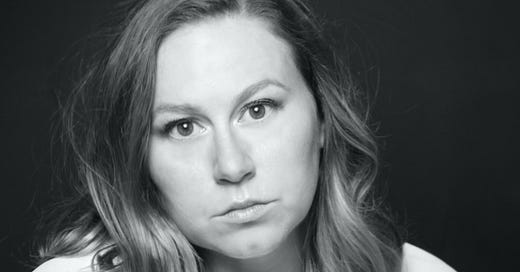


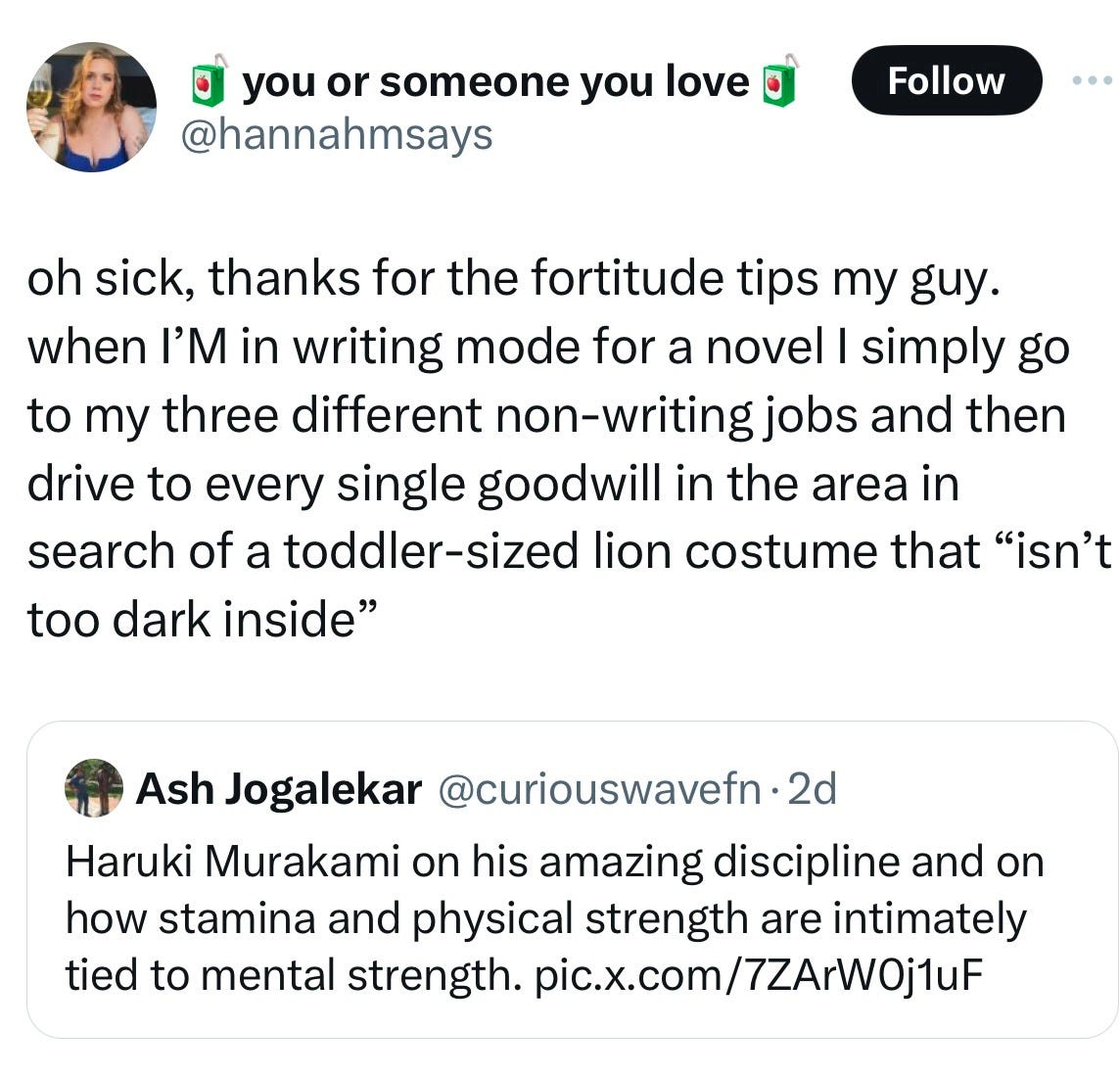
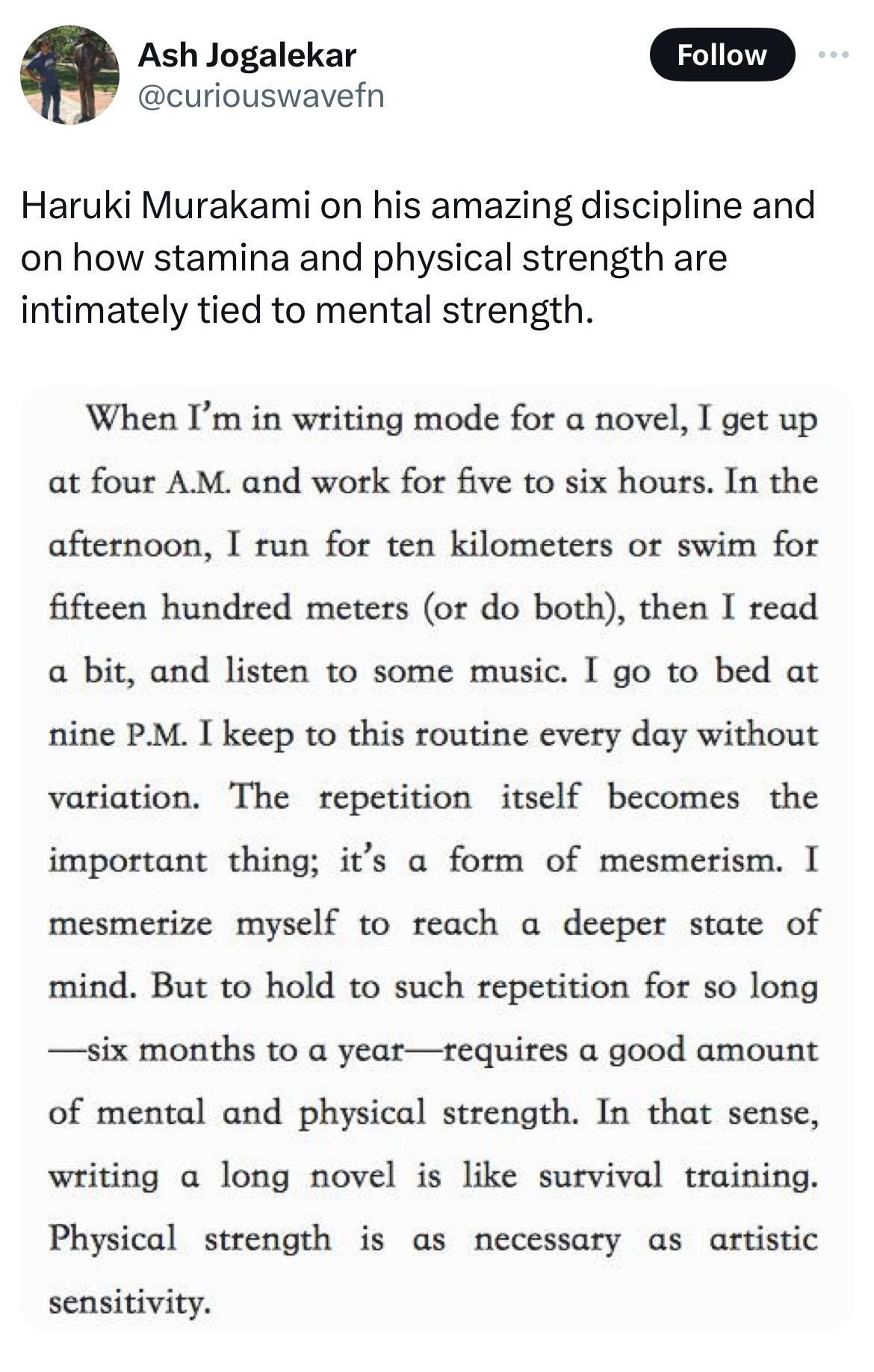
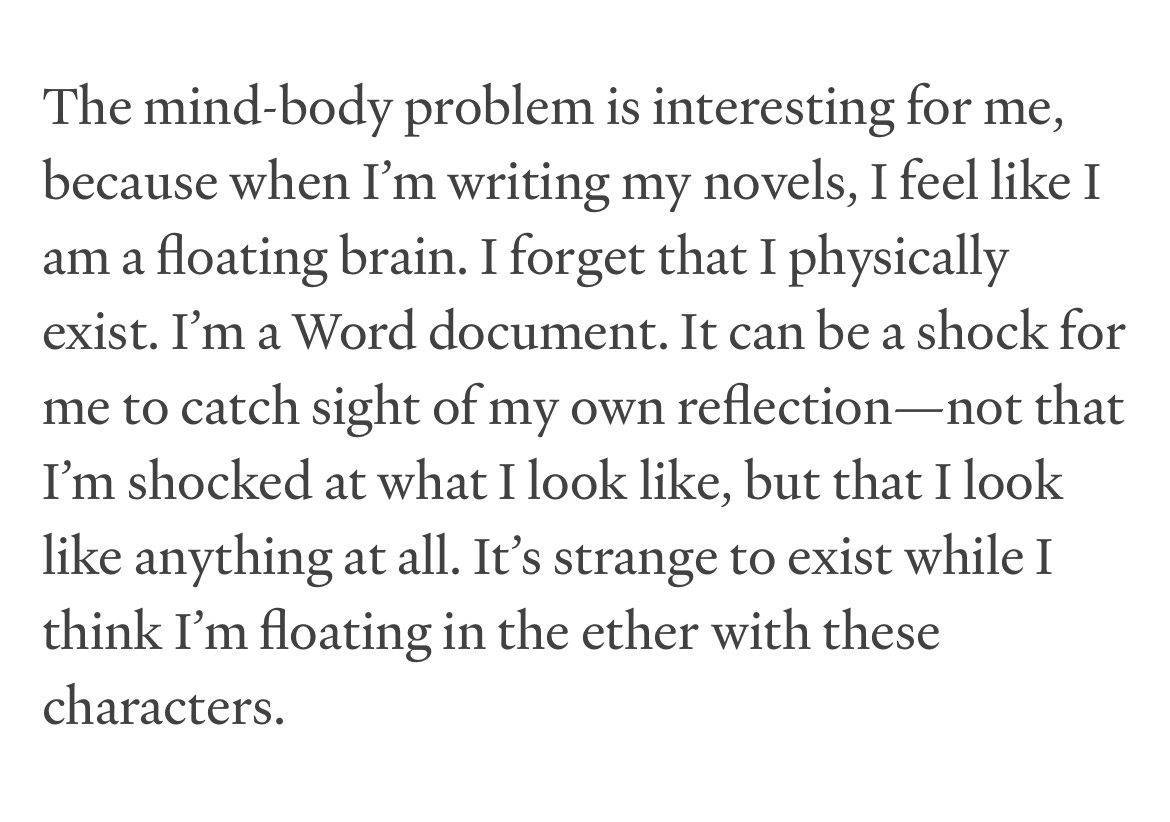
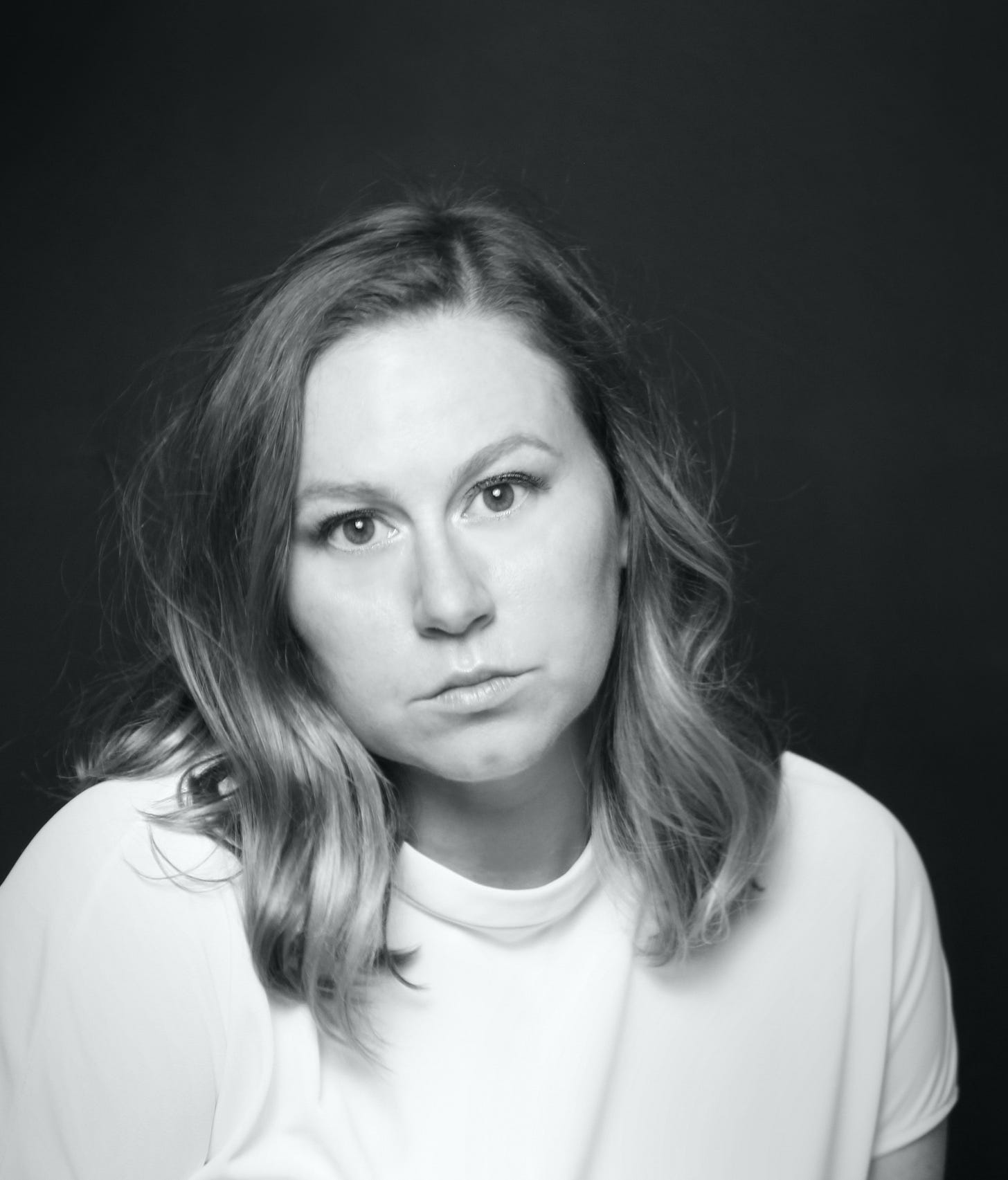
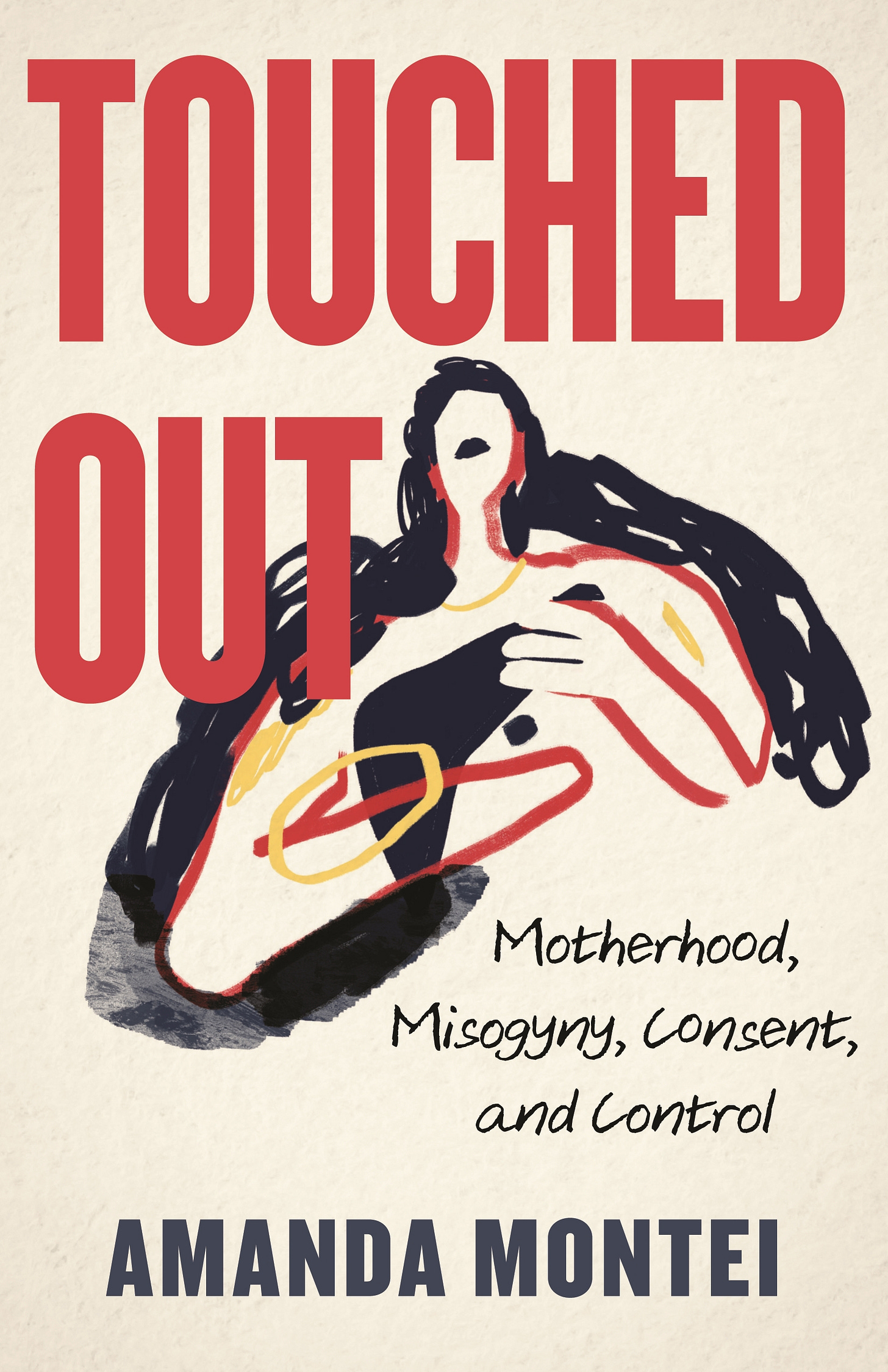
I have been hit by the recent "floating brain" discourse, too! As a mother of three kids, writing a phd thesis at the moment. THANKS for this.